Sudan’s Economic and Political History Part III (1989-2013): Bill Clinton vs. Omar Al-Bashir, South Sudan’s Independence, & the Darfur Crisis!
An Example of American Sanctions Successfully Pressuring a Government & the Challenges of a Hasty Two-State Solution
Explore Part 1 for concise-yet-detailed 4,000-year history of Sudan, from the Kerma civilization through colonialism to independence and the first military coup.
In Part 2 dive into the First South Sudanese Rebellion, Sudan’s agricultural struggles, its involvement in the Arab-Israeli conflict, the discovery of oil, and the onset of the Second South Sudanese Rebellion.
Today, we’ll examine Omar Al-Bashir’s rule and the Second South Sudanese Rebellion, the longest war in modern African history (1983-2005).
Omar Al-Bashir (1989-2019)
Omar al-Bashir, an Islamist and military colonel, became Sudan's strongman leader.
Allegedly, he siphoned $9B in oil money from the Sudanese treasury into British banks. He ran sham elections to maintain his power, transitioning to a civilian government in 1993 to qualify for Western aid.
Geopolitics of Al-Bashir:
Sympathized with Saddam’s Invasion of Kuwait:
When Iraqi President, Saddam Hussein, attempted to annex Kuwait, Omar al Bashir, along with the leaders from Jordan, Libya(Gaddafi), Yemen, Tunisia, Algeria, and the Palestinian Liberation Organization (PLO) had supported Saddam.
Al Bashir, provided financial and military assistance to Saddam, who in return assisted Al-Bashir in weapons production.
After George H.W. Bush created an international coalition to kick Saddam out of Kuwait, the West and Gulf monarchies became angry with Sudan’s support for Iraq, leading to cuts in financial support, crippling Sudan’s economy.
Becoming a “Haven of Islamic Terror”: One of al-Bashir’s coup colleagues, the charismatic theologian, Hassan al-Turabi, led the Islamist movement known as the National Islamic Front, affiliated with the Sudanese Muslim Brotherhood.
Under al-Turabi and al-Bashir, Sudan implemented an austere form of Sharia: strict dress codes, alcohol bans, and restrictions on mixed-gender social gatherings.
Al-Turabi also founded the Popular Arab Islamic Congress, an organization seen by the West as a "Legion of Doom." Guests included Osama Bin Laden (who wasn’t a terrorist yet but seen as as “hero” for kicking out the Atheist Soviet Union from Afghanistan), as well as representatives from Gaddafi’s Libya, Abu Nidal, Yasser Arafat of the PLO, Hezbollah, Iran, and Muslim Brotherhood-affiliated groups from Lebanon, Jordan, Syria, Tunisia (Ennahda), Algeria (Islamic Salvation Front), Egypt, and Palestine (Hamas).
After the Soviet defeat in Afghanistan, Osama Bin Laden and al-Qaeda found refuge in Khartoum, making training grounds for terrorism. Bin Laden even married one of al-Turabi's nieces, and partnered with Turabi’s son in trading Arabian horses. He also supported Al-Bashir’s fight against the South Sudanese separatists and funded infrastructure projects like the highway connecting Khartoum to Port Sudan.
In 1993, Al-Qaeda’s attack on the World Trade Center prompted Bill Clinton to add Sudan to the “State Sponsors of Terrorism” list. This designation led to significant consequences: the U.S. restricted foreign aid to Sudan, banned American firms from selling weapons to the state, barred Sudan from accessing American banks, froze Sudanese assets in the U.S., and imposed a trade embargo. This was a big deal, as prior to this, Sudan was the largest recipient of American development and military aid in Sub-Saharan Africa.
Al-Turabi funded Egyptian Islamic Jihad, which attempted to kill Egyptian President, Hosni Mubarak, in 1995 in the Organization for African Unity Conference in Ethiopia. Egypt and Sudan almost went to war over the incident. In April 1996, UN Security Council sanctioned Sudan for refusing to hand over the Sudanese individuals involved with Egyptian Islamic Jihad assassination plot.
To appease Egypt and the U.S., Al-Bashir expelled Egyptian Islamic Jihad and Osama bin Laden, who relocated to Afghanistan in 1996. Al-Bashir allegedly offered to hand over bin Laden to Bill Clinton, but Clinton didn’t trust him. After bin Laden’s departure, Sudan’s government confiscated and sold all of Al-Qaeda’s businesses.
However, Al-Bashir still supported the Palestinian cause, providing haven and funding for militant groups like Abu Nidal, Hezbollah, and Palestinian Islamic Jihad. Omar Al-Bashir allowed Sabri al-Banna, also known as Abu Nidal, leader of Abu Nidal Organization (ANO) or Revolutionary Organization of Socialist Muslims to live in Khartoum. The ANO was a militant splinter group of the PLO and killed a senior Jordanian Diplomat, murdered the second in command of the PLO, shot a synagogue in Istanbul, and etc.
In 1996, Clinton closed the U.S. embassy in Sudan. Then in 1997, Clinton imposed tougher comprehensive sanctions, which targeted the ENTIRE Sudanese Economy (not just the government). U.S. firms were banned from doing business in Sudan, all Sudanese citizens with U.S. denominated assets were frozen, and all Sudanese firms could not receive American goods or export goods to America. Sudan was cut off from IMF loans and debt relief from the Paris Club, London Club, World Bank, or International Monetary Fund. The only countries that still lent to Sudan were China, India, and some Gulf states.
In 1998, Al Qaeda bombed the US embassies in Nairobi, Kenya and Dar es Salaam, Tanzania, murdering 220+ people.
The terrorists were given Sudanese passports. Also, according to the American District Court of DC, the Sudanese intelligence service allegedly facilitated Al-Qaeda to cross the Sudan-Kenya border and provided logistical support (Sudan denies this). America held Sudan responsible, and said Sudan had to pay $4.3B in punitive damages to the victims of the truck bombs.
Clinton retaliated against Sudan by authorizing a US Navy cruise missile on the al-Shifa pharmaceutical factory in Khartoum, falsely claiming it was producing VX nerve gas for AL-Qaeda. In reality, the factory was making antibiotics, anti-malaria medicine, and other pharmaceuticals.
In 1999, the sanctions were starting to work, Omar Al-Bashir fell out with Al-Turabi and imprisoned him. Also, Al-Bashir mended ties with Mubarak in the early 2000s. He was trying to end support for terrorism, but in the year 2000, Al-Qaeda attacked the USS Cole while it was refueling in Yemen's Aden Harbor.
The attackers had Sudanese passports (AGAIN), trained for terrorism in Sudan, and the US Courts held the Sudanese government responsible due to its past support Osama Bin Laden.
In the 2000s, American firms like Marathon Oil divested from Sudan along with British firms like Weir Group & Rolls Royce due to sanctions.
Then 9/11 happened and Bush invaded Afghanistan for harboring Al-Qaeda. After this, Al-Bashir tried to partially de-Islamize the state. The NIF became the National Congress Party, and Omar Al Bashir assisted with American counterterrorism efforts to get removed from the “state sponsor of terrorism list”. After Bush invaded Iraq for no reason, Al-Bashir was scared that he would be next.
As a result of sanctions, Sudan relied more heavily on financing from Gulf states and China. From 2000-2022, Sudan received $6.1B from China for energy, banking, water, transportation, and agriculture.

In addition, Al-Bashir used French Bank - BNP Paribas, which ignored American sanctions and served as his de facto central bank, facilitating access to international markets, the US dollar, and funding his government.
2nd South Sudan Rebellion/2nd Sudanese Civil War:
While supporting, and then backing out of terrorism, Al-Bashir halted negotiations with the South Sudanese rebels or SPLM (Sudanese People’s Liberation Movement). He escalated violence and intensified Arabization and Islamization in South Sudan. By 1991, with the fall of Communist Ethiopia— the rebels' main backer— 200,000 South Sudanese rebels were expelled from Ethiopia. Al-Bashir also funded Joseph Kony’s Ugandan Lord’s Resistance Army to destabilize South Sudan. During the war, the H.W. Bush administration and the UN worked together to send emergency relief to the south.
The SPLM splintered and fought each other as well. Some South Sudanese fought over independence vs. a united, secular Sudan. Some divisions were ethnic between the Nuer and Dinka Southerners. Al-Bashir exploited these divisions to hamper their efforts. One of the worst “South on South” massacres of the 2nd Civil War was the Bor massacre in 1991. In addition, Al-Bashir was able to use the splinter groups to extract oil from the South.
Fortunately, the South Sudanese united in 2001, and George W. Bush (younger one), was very sympathetic to the South Sudanese Christians and pressured Al-Bashir to end the conflict.
Colin Powell in the Bush administration told Al-Bashir if he signed the deal, America would consider removing Sudan from a “State Sponsor of Terror”.
In Kenya in 2002, Sudan and the SPLM signed the Machakos Protocol. The protocol allowed South Sudan to have a vote for union or secession. Power sharing was agreed in 2004.
When the war ended in 2005, 2M Southern Sudanese died, 4M displaced, and many were sold to slavery. Condoleezza Rice of the Bush Administration told Al-Bashir that he would have had his sanctions removed, but the Darfur situation exacerbated…
West Sudanese Rebellion/Darfur Genocide (2003-2008):
Darfur is Arabic for “Land of the Fur” and has Masalit, Zaghawa, and Fur Africans, who are Muslim but don’t identify as Arab like most Sudanese. The region is as big as France. Due to drought and locusts, land clashes arose between Afro-Arabs and non-Arab Africans, including farmers and herdsmen.
During the Chadian-Libyan war in the 1980s, many Chadian Baggara Arabs, fleeing President Hissene Habre of Chad's anti-Arab policies, settled in Darfur. Gaddafi funded and trained these African Arabs to attack Chad, joining Gaddafi’s “Islamic Legion” and “the Arab Gathering”, harboring an anti-African & Arab Supremacist Ideology.
But after Gaddafi failed to annex Chad, many of them stayed in Darfur and joined the anti-African Murahaleen militias in Sudan. The Muraheleen Baggara Arabs created an apartheid regime in Darfur in the 90s.
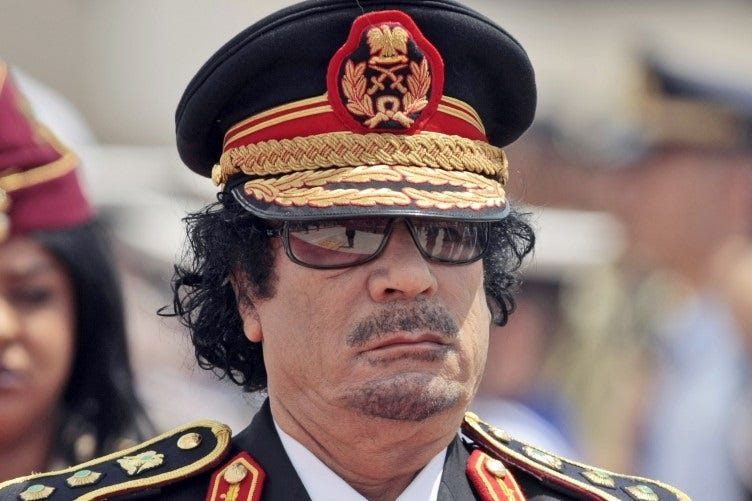
When Al-Bashir took power, he divided Darfur into three regions to weaken it politically. The non-Arab Darfurians, particularly the Masalit, revolted against Arab oppression in 1995. Al-Bashir sided with the Murahaleen Arabs to crush the Masalit, leading to a ceasefire in 1999.
By 2003, non-Arab Africans fed up with the Afro-Arab Supremacism & being pushed out of the Sudan-South Sudan peace talks in 2002, formed the the Sudan Liberation Movement/Army (SLA) and the Justice and Equality Movement (JEM), attacking the Murahaleen militias and demanding self determination/regional autonomy & economic development. Ironically, by the 2000s, Gaddafi converted from Pan-Arabism to Pan Africanism and funded the non-Arab Darfurian rebel groups.
To maintain plausible deniability, Al-Bashir armed the Murahaleen militias (instead of his army), now called the “Janjaweed” or “Devils on Horseback” to suppress the non-Arab Darfurians, initiating the Darfur genocide. Hundreds of thousands of Darfurians fled to Chad, which led to a conflict between Chad vs Sudan & the Janjaweed. I go into the Chad-Libya-Sudan dynamics more in my Chad article, here.
JEM sought peace talks for independence like South Sudan, but Al-Bashir feared a domino effect—first South Sudan, then Darfur, and possibly Nubia. To prevent this, he unleashed the Janjaweed in a brutal counterinsurgency, involving mass rape and stealing food for NGOs so Darfurians would starve. The African Union intervened in 2004, but failed to stop the violence.
~500K people were killed and 2.5M were displaced. The genocide attracted global outrage. Bush installed new sanctions on Al-Bashir.
By 2009, Al-Bashir was the first head of state to be indicted by the International Criminal Court accusing him of masterminding a plan to genocide out the non-Arab Darfurians. Many Non-Western countries, including the African Union & Arab League opposed the arrest warrant. They found it absurd that U.S. wasn't indicted for Iraq or Israel for actions in Palestine, while Al-Bashir was targeted. Many leaders continued diplomatic ties with Al-Bashir.

India, Iran, and Russia are not signatories of the ICC’s Rome Statute (neither is America or Israel), so they ignored the ICC warrant and allowed Al-Bashir to step foot in their countries.
Oil & the Economy
Despite oil being discovered earlier, it wasn't exported until 1999 due to the 2nd South Sudanese Rebellion. Al-Bashir built refineries in the North, as most of the oil was in the South.
Sudan (which includes South Sudan for now) ranked 23rd in global oil reserves with ~5B barrels, more than Egypt, but less than Mexico, Angola, or Oman.
It’s worth noting that oil is capital intensive, not labor intensive. Most Sudanese were still farmers or informal workers.
To export the oil, Sudan’s state owned oil firm, Sudapet (5% ownership) formed a joint venture with China’s CNPC (40%), Malasyia’s Petronas(30%), and India’s ONGC(25%) called the “Greater Nile Petroleum Operation Company” (GNPOC).
They built a pipeline connecting South Sudan’s oil fields to Port Sudan. By 1999, the pipeline was completed, and Sudan became an oil exporter, with China as its largest buyer.
Oil and refined petroleum products became Sudan’s largest export, ending its reliance on cotton.
Despite sanctions & war, Al-Bashir used oil revenue to expand healthcare, education, and infrastructure, leading to more universities by the end of his 30-year rule. From 1999 to 2010, Sudan experienced a golden age & oil boom, with oil accounting for 95% of foreign exchange and 60% of government revenue. In 2007, Sudan advanced from 'low-income' to 'lower-middle income,' with growth in telecom and financial services as well.
However, most places in Sudan were in grinding poverty. Most of the growth was mostly in cities like Khartoum, which had a real estate boom.
The graph below highlights the difference in how Sudan and Algeria managed their oil revenues. Sudan consistently shows negative adjusted net savings (ANS), while Algeria maintains positive ANS.
ANS reflects the balance of government, corporate, and household savings and expenditures, adjusted for factors like natural resource depletion and environmental degradation. Positive ANS in Algeria indicates that the country exported more than it imported, saved a significant portion of its oil revenue, and built up foreign reserves, reflecting prudent economic management and sustainable investment in public goods and infrastructure. In the year 2000, Algeria made a sovereign wealth fund which as of 2024 as $16B.
In contrast, Sudan’s consistent negative ANS suggests the country failed to convert its oil revenues into sustainable investments, depleting its oil and incurring environmental costs without adequate reinvestment in public goods on the aggregate, leading to borrowing to finance consumption and investment needs. Sudan made a sovereign wealth fund in 2002, and was virtually depleted in 2010.
While borrowing can be justified for less developed countries since they can’t internally finance themselves, Sudan's investments didn’t outpace its growing debt, reflecting an unsustainable strategy. This mismanagement led Al-Bashir to reduce fuel subsidies & remove the currency anchor, which sparked riots in the 2010s.
It's unfortunate because Sudan relied heavily on oil for economic growth, while livestock, agriculture, and manufacturing saw minimal progress.
In 2000s, Omar-Al Bashir a manufacturing push by making the industrial city GIAD. It made weapons and cars, but they were very uncompetitive. Buyers preferred German or Japanese cars and American, French, or Russian weapons.
The Comprehensive Peace Agreement with South Sudan
By 2005, the 2nd South Sudanese rebellion ended, leaving Sudan nearly bankrupt due to the sanctions & military expenditure. Post War, a new constitution was adopted, with the North & South sharing oil revenues. A comprehensive peace agreement was signed: Sharia would apply only in the North, and a 2011 referendum on South Sudanese independence was scheduled. A power-sharing deal made former rebel leader John Garang VP, with Bashir as President.
Unfortunately, John Garang died in a helicopter crash in 2005.
98.8% of South Sudanese voted independence. They became a new state on July 9th 2011.
Complications Post-Independence: Abyei, Blue Nile, & South Kurdufan
At South Sudan's independence, several issues remained unresolved from the comprehensive peace deal:
1. Border delineation, especially over the oil rich Abyei region
2. Citizenship for South Sudanese living in Sudan
3. Division of international debt
4. Allocation of oil revenues
With 75% of the Sudan’s oil reserves in the South Sudan, North Sudan was economically crippled. Oil accounted for over half of Sudan’s government revenue and 95% of Sudan’s foreign currency receipts. Sudanese’s quality of life plummeted. Oil was the lynchpin of al-Bashir’s patronage network.
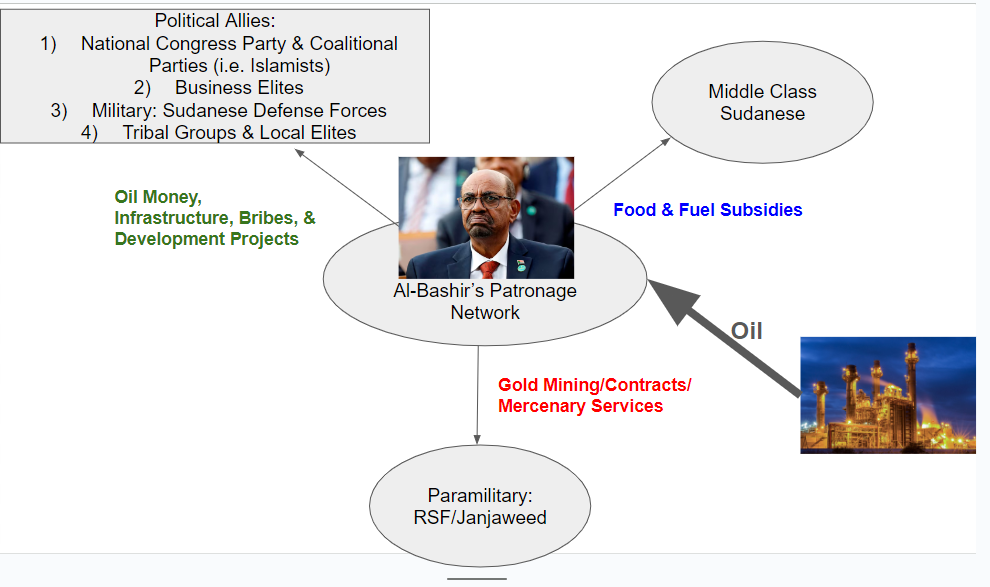
Notably, his patronage network largely ignored Sudan’s rural population, which is the majority of the country.
Without oil to placate interest groups, Al-Bashir’s life was in danger. Non-Islamist Sufi Muslims, Non-Arab Sudanese, and Ultra-Islamist Al-Turabi acolytes all hated him.
South Sudan immediately had post-independence issues also. It’s landlocked and without oil refineries. The pipelines and refineries needed to transport its oil would flow to the Northern refineries in El Obeid or Khartoum and then be transported to the world via Port Sudan. See the picture below:
The only places in Sudan left with oil after south Sudan left were the disputed territories of South Kordofan, Abyei, and the Blue Nile State.
These areas were supposed to vote on joining the North or South after July 2011, but these elections were postponed repeatedly. Even before South Sudan’s independence, both sides fought over these regions, especially the oil rich Abyei. Many Sudanese in these regions fled. Now a new rebel group, backed by South Sudan emerged in the border areas, called SPLM-North. The SPLM-North continues fighting Sudan today as of August 2024.
As a newly independent landlocked state, South Sudan relies on Sudan to export its oil, paying transit fees to North Sudan. After losing oil revenue, Omar al-Bashir drastically increased these fees. In response, South Sudan’s President Salva Kiir shut down the oil pipeline, crippling revenue and foreign currency for both countries, causing inflation and severe budget cuts. Al-Bashir had to reduce fuel subsidies to maintain a cash buffer, which sparked anti-regime riots in Khartoum.
Post-Oil Sudan
Without South Sudanese oil, Al-Bashir issued Sukuk bonds (Sharia-compliant bonds) for funds. But replacing oil with debt isn’t sustainable.
Concluding Thoughts
Al-Bashir made poor strategic bets, first siding with Saddam Hussein in the Gulf War, doubting that H.W Bush would rally the world for Kuwait. His second misstep was aligning with a hardcore Islamist that was buddies with Osama Bin Laden, who was initially a “Holy War Hero” for expelling the Soviets from Afghanistan but later became infamous as an international terrorist. Bin Laden’s presence in Sudan led to U.S. sanctions under Bill Clinton.
While people often say U.S. sanctions don’t work, Sudan is an exception; America waved its sanctions as a Damocles hanging over Al-Bashir’s head to kick out bin Laden & Al-Qaeda, allow South Sudanese self determination, and support American counter terrorism efforts.
However, the unresolved territorial issues between Sudan & South Sudan really make me question the effectiveness of a "Two State Solution first, resolve conflicts later" approach.
Next time we will conclude our Sudan discussion with the 2nd Darfur Crisis, the December Revolution, and Sudan’s current Civil war. Continue to Part 4 here.


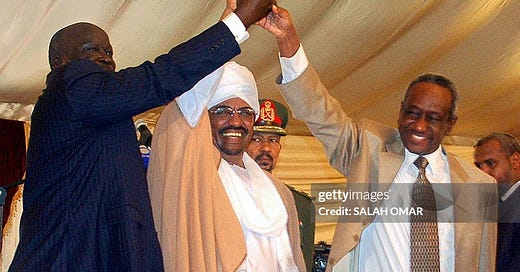




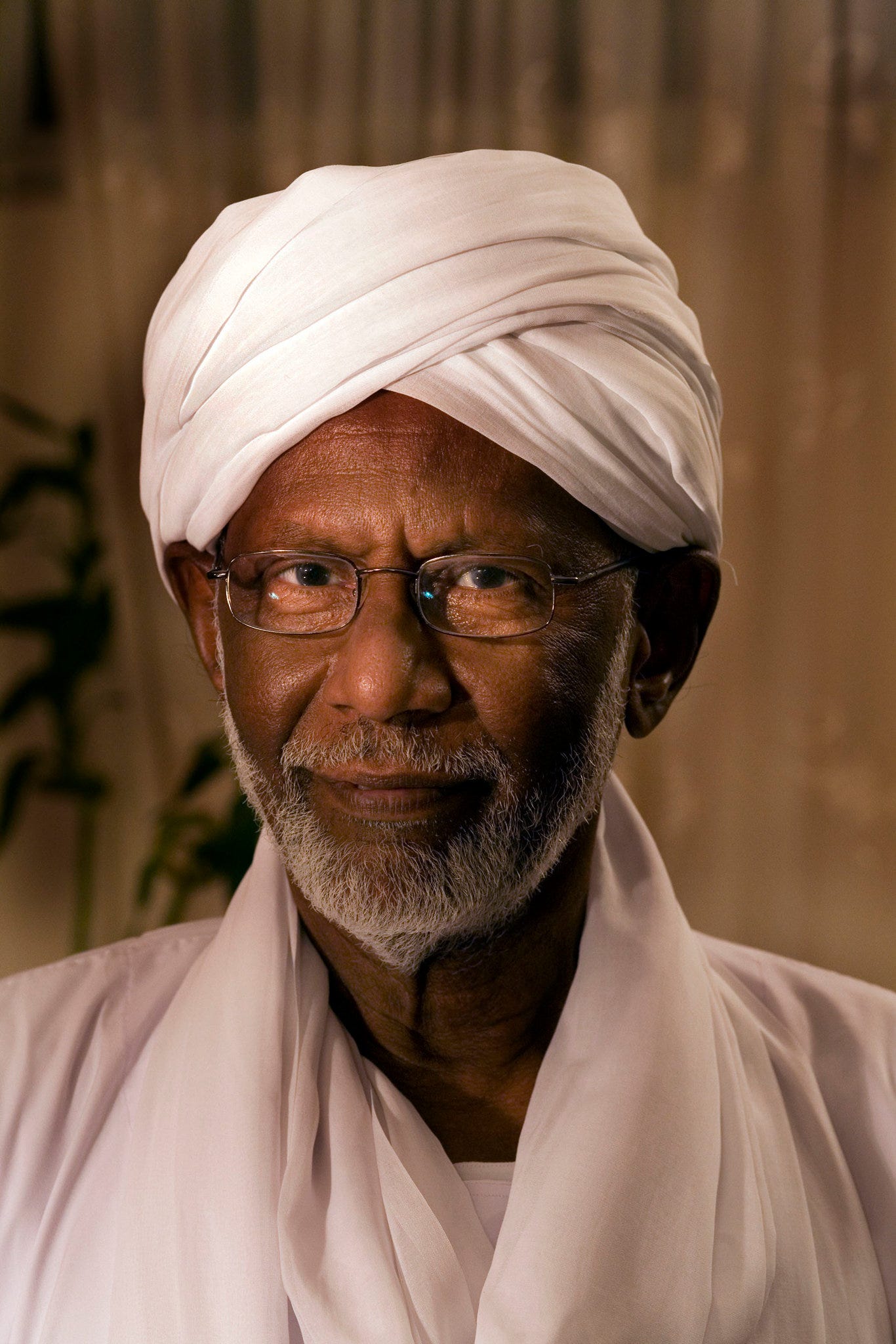
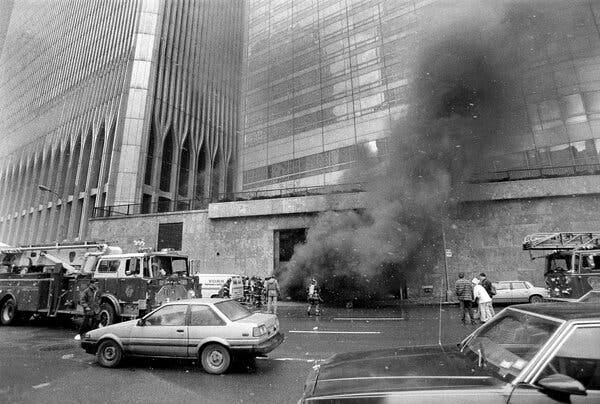
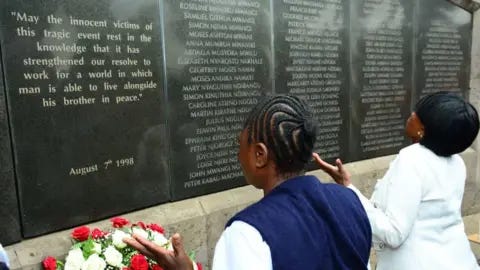
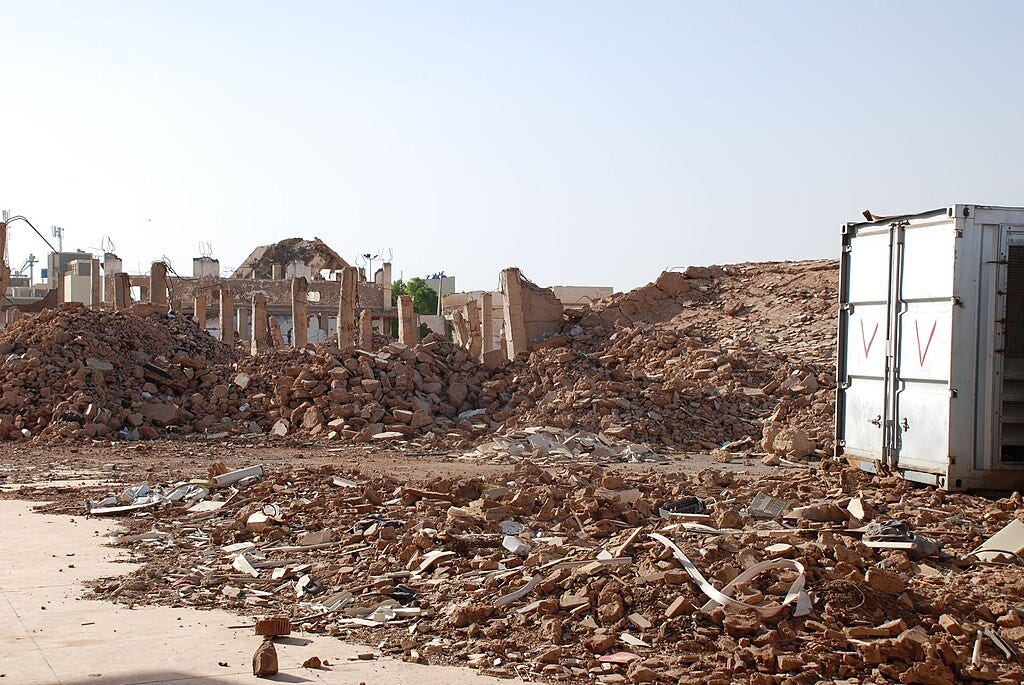
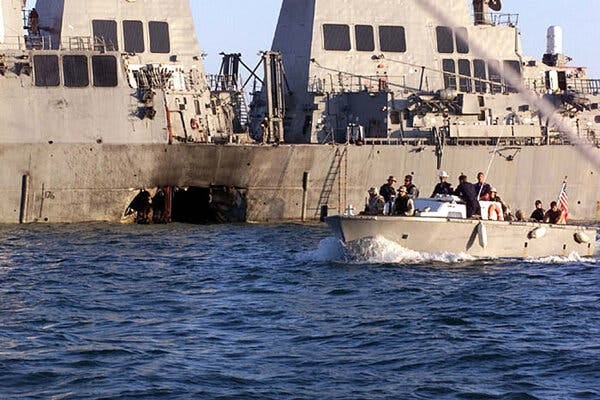
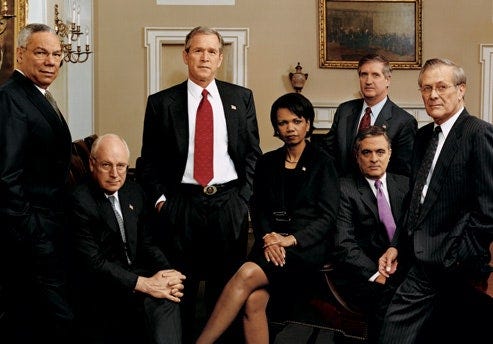


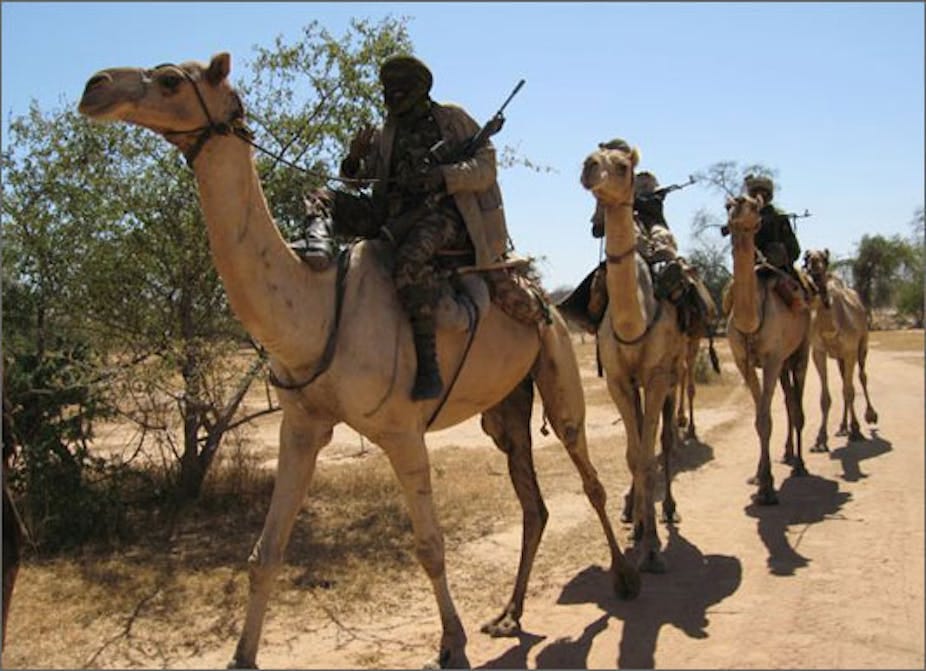

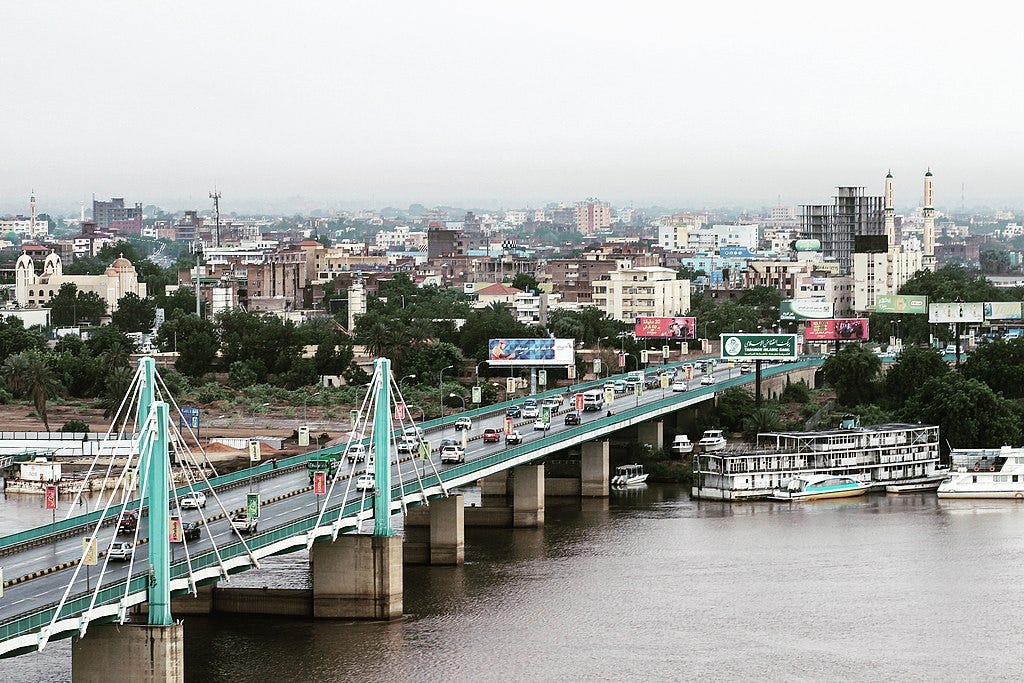



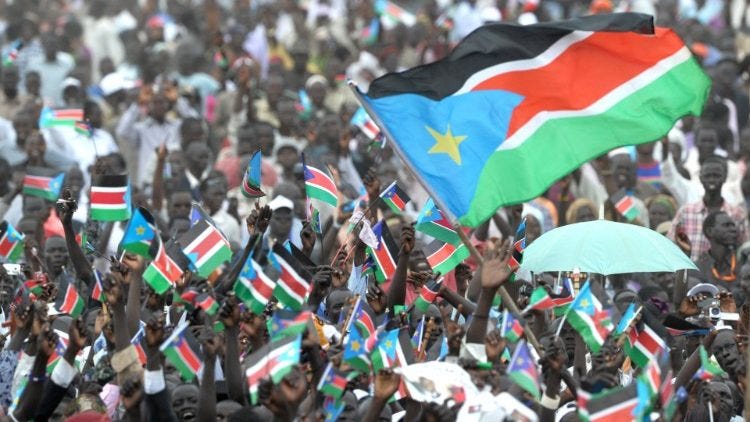

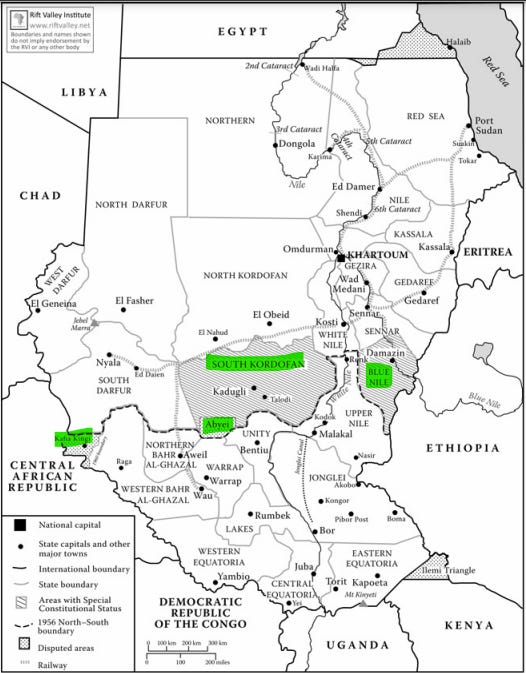
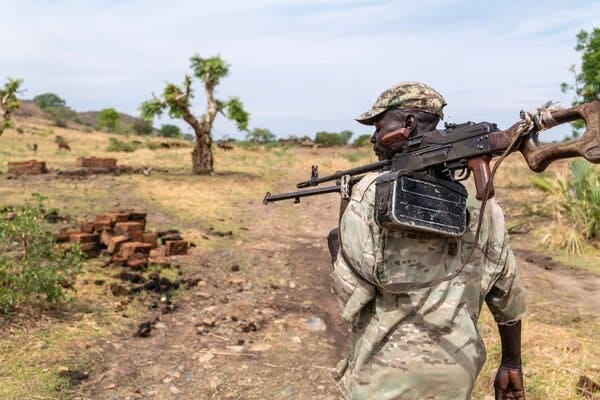
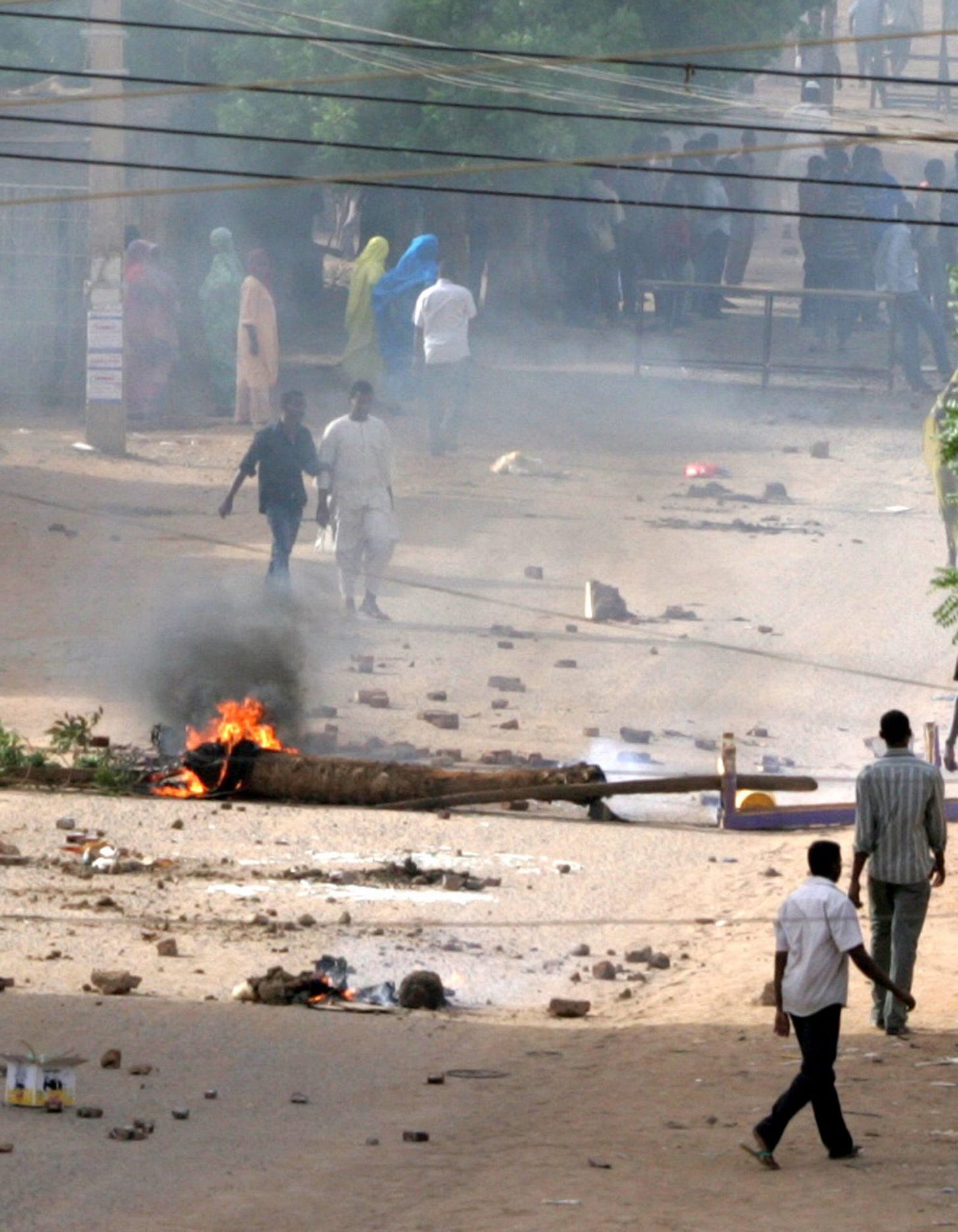
Really interesting piece! Honestly seems like the US should have invaded Sudan instead of Iraq in 2003 - that could’ve at least averted some of the problems in South Sudan and Darfur. Then again, knowing the US, it probably would have found some other way to mess things up there instead.
Really enjoyed this! very illuminating